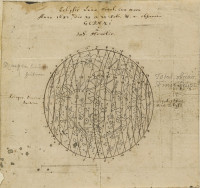Intestinal worm and eclipse
Date
1683
Creator
Unknown, Engraver
Creator - Organisation
The Royal Society, Publisher
Object type
Article identifier
Material
Technique
Dimensions
height (page): 150 mm
width (page): 213mm
width (page): 213mm
Subject
Content object
Description
12 figures from issue 146 of Philosophical Transactions of the Royal Society, including anatomical studies of a worm, as found in the intestine of dissected dog, and astronomical study of a lunar eclipse.
Figure 2. Showing the length of a worm that measured five feet.
Figure 3. Showing the two heads of a worm, ‘placed like the Horns of a Snail’.
Figure 4. Showing an alternative form of the head of a worm, as described by ‘Tulpius’.
Figures 5-9. Showing various views of the joints of a worm.
Figure 10. Detail view of the mouth of a worm.
Figures 11-12. Microscopic view of the head of a worm.
Illustrations to ‘Lumbricus latus, or a discourse read before the Royal Society of the joynted worm, wherein a great many mistakes of former writers concerning it, are remarked; its natural history from more exact observations is attempted […]’ in Philosophical Transactions of the Royal Society, vol. 13, issue 146 (10 April 1683). Original illustrations can be found in Manuscripts General MS/618 (9r-10v).
Figure 13. Showing the surface of the Moon, with phases of the lunar eclipse entered on top of it, as observed by Johannes Hevelius in February 1682.
Illustration to ‘Eclipsis lun AE totalis cum mora, anno 1682, die 21 & 22 Feb. vesp. & mane st. n. observata gedani a Joh. Hevelio’ in Philosophical Transactions of the Royal Society, vol. 13, issue 146 (10 April 1683). Original letter containing this illustration can be found in Early Letters of the Royal Society EL/H2/55.
Figure 2. Showing the length of a worm that measured five feet.
Figure 3. Showing the two heads of a worm, ‘placed like the Horns of a Snail’.
Figure 4. Showing an alternative form of the head of a worm, as described by ‘Tulpius’.
Figures 5-9. Showing various views of the joints of a worm.
Figure 10. Detail view of the mouth of a worm.
Figures 11-12. Microscopic view of the head of a worm.
Illustrations to ‘Lumbricus latus, or a discourse read before the Royal Society of the joynted worm, wherein a great many mistakes of former writers concerning it, are remarked; its natural history from more exact observations is attempted […]’ in Philosophical Transactions of the Royal Society, vol. 13, issue 146 (10 April 1683). Original illustrations can be found in Manuscripts General MS/618 (9r-10v).
Figure 13. Showing the surface of the Moon, with phases of the lunar eclipse entered on top of it, as observed by Johannes Hevelius in February 1682.
Illustration to ‘Eclipsis lun AE totalis cum mora, anno 1682, die 21 & 22 Feb. vesp. & mane st. n. observata gedani a Joh. Hevelio’ in Philosophical Transactions of the Royal Society, vol. 13, issue 146 (10 April 1683). Original letter containing this illustration can be found in Early Letters of the Royal Society EL/H2/55.
Related fellows
Johannes Hevelius (1611 - 1687, German/Polish) , Astronomer
Associated place
